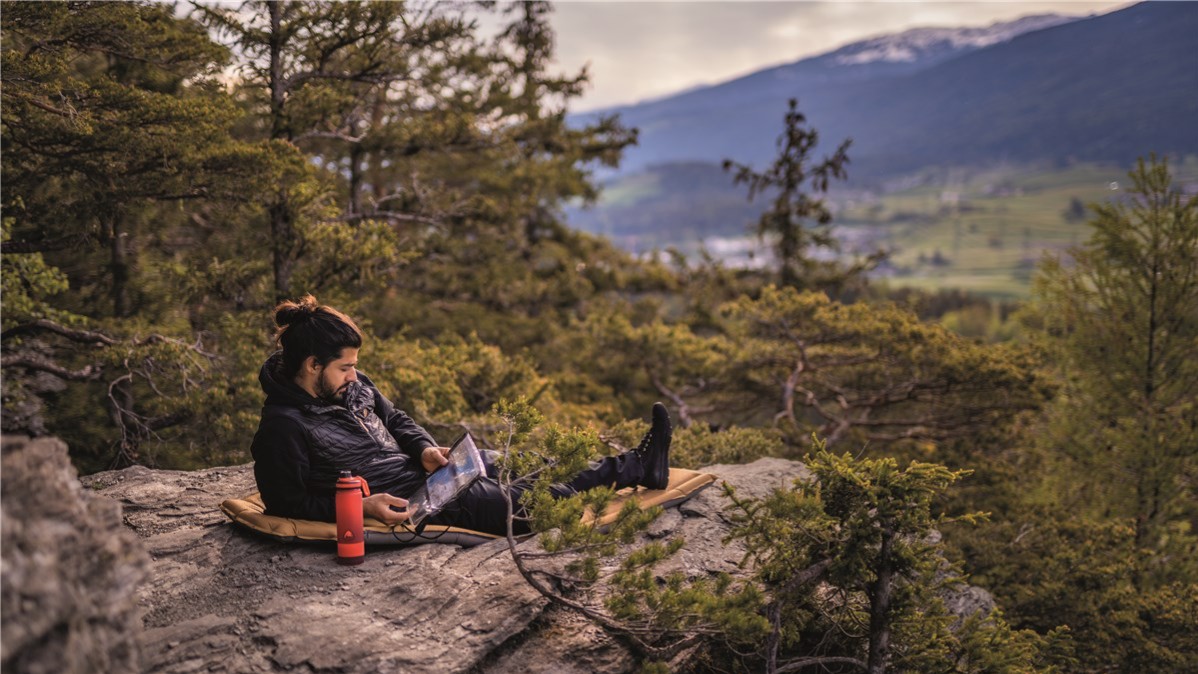Advnture Verdict
Innovative hybrid construction, generous dimensions and practical air-filled side rails makes this our top pick from all the self-inflating sleeping mats (SIMs) we tested.
Pros
- +
Good value
- +
Very warm
- +
Durable
- +
Generous dimensions
- +
Raised edge baffles to help stop you sliding off
Cons
- -
Not as thick as some rivals
- -
Comparatively heavy and bulky when packed
You can trust Advnture
First impressions
The Robens Trailguard 50 sleeping pad is well worth a look if you like the long-term durability and ease of use that a self-inflating mat offers over air mats. In fact, this is our top self-inflating mat (SIM) pick from all the options we tested.
This mat has a hybrid construction, with an internal foam base and twin air-filled edge chambers, designed to maximise thermal efficiency and comfort. The central area of the mat has a foam core, providing effective insulation for the torso, while strategically placed cut-out sections at the extremities help to reduce overall weight.
- Stay warm while you're camping with the best sleeping bags
- Want other options for a good night's sleep? Check out the best sleeping pads here
- Learn how to choose a sleeping pad
This all contributes to the mat’s impressive R-value of 5.3, which makes it suitable for four-season use in temperatures way below zero. But the Trailguard 50 also delivers a reasonable weight and pack size that means this is still a practical option for backpacking and trekking, if a little bulkier than its absolute top-end rivals.
• RRP: £93 (UK)
• Style: Self-inflating mat
• Weight: 925g/2lb 0.5oz
• Variants: One size
• Dimensions (regular): 185 x 58cm/73 x 23in
• Thickness: 5cm/2in
• Pack size: 24 x 19cm/9.5 x 7.5in
• R-value: 5.3
• Compatibility: 4-season
In the field
We liked the Trailguard 50’s generous dimensions and squared-off mummy cut, which gives plenty of room to relax. The practical shape means it will still fit in all but the most coffin-like solo backpacking shelters.
While it’s not the thickest mat around, at 50mm it is still relatively plush, particularly compared to most other SIMs. It also boasts a very stable base, which adds to the sense of overall sleeping comfort – as do the air-filled side rails, which mean it is virtually impossible to slide off the mat during the night and end up on cold, hard ground.
The 30-denier polyester face fabric has a textured surface that also feels pleasantly soft, even on exposed skin. Admittedly, polyester ought to be comparatively less durable than similar weight nylon, but it still feels pretty tough, and our experience of Robens kit is that it is well made and built to last. This mat is certainly far less delicate than many ultralight pads. We happily sat on it outside the tent to take in a spectacular Snowdonia sunset with no concerns.
The Trailguard 50’s only real drawbacks are the same as those of all self-inflating mats – compared to an air mat, it doesn’t have quite the same level of cushioning, and nor is it quite as lightweight or packable.
All the latest inspiration, tips and guides to help you plan your next Advnture!
On the other hand, it is warmer than many air mats (including some of the insulated versions we tested), and it’s quicker to inflate too. You can basically unroll it and let it do its thing, requiring just a few breaths to top it up to optimum levels of cushioning before you climb into your sleeping bag.
Since you need to inflate those two side chambers, you do need to put in a little more puff than with other SIMs, but we liked the ‘side rails’ feature so much that we felt this was easily a price worth paying. Robens’ ‘Peak Valve’ is also easy to use, and largely addresses the minor annoyance of deflating the mat (the other negative of most SIMs), since it has a central shaft that can be pushed to turn it from a one-way valve to a two-way system, making the chore of packing the mat away far less frustrating.
An outdoors writer and editor, Matt Jones has been testing kit in the field for nearly a decade. Having worked for both the Ramblers and the Scouts, he knows one or two things about walking and camping, and loves all things adventure, particularly long-distance backpacking, wild camping and climbing mountains – especially in Wales. He’s based in Snowdonia and last year thru-hiked the Cambrian Way, which runs for 298 miles from Cardiff to Conwy, with a total ascent of 73,700 feet – that’s nearly 2½ times the height of Everest. Follow Matt on Instagram and Twitter.


